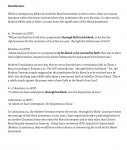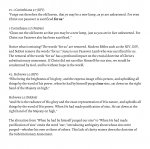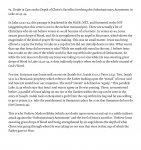The Error of KJV-Onlyism
- Thread starter presidente
- Start date
-
Christian Chat is a moderated online Christian community allowing Christians around the world to fellowship with each other in real time chat via webcam, voice, and text, with the Christian Chat app. You can also start or participate in a Bible-based discussion here in the Christian Chat Forums, where members can also share with each other their own videos, pictures, or favorite Christian music.
If you are a Christian and need encouragement and fellowship, we're here for you! If you are not a Christian but interested in knowing more about Jesus our Lord, you're also welcome! Want to know what the Bible says, and how you can apply it to your life? Join us!
To make new Christian friends now around the world, click here to join Christian Chat.
@turbosixx
1 John 5:7 is the only verse that tells us about the Trinity point blank.
This verse is confirmed by early Latin manuscripts and early church fathers.
1 John 5:7
"For there are three that bear record in heaven, the Father, the Word, and the Holy Ghost: and these three are one."
1 John 5:7 in Modern Bibles removes this beautiful truth on the Trinity.
Again, no surprise because they had a Unitarian on the translation committee on the Revised Version 1881.
They preferred two manuscripts that did not have this reading even when double dots showed a variant for 1 John 5:7 in the Vaticanus.
So again, which Bible is the Holy Bible?
The Modern Bibles and the KJB both cannot be the Holy Bible.
They say different things.
There can only be one Holy Bible.
1 John 5:7 is the only verse that tells us about the Trinity point blank.
This verse is confirmed by early Latin manuscripts and early church fathers.
1 John 5:7
"For there are three that bear record in heaven, the Father, the Word, and the Holy Ghost: and these three are one."
1 John 5:7 in Modern Bibles removes this beautiful truth on the Trinity.
Again, no surprise because they had a Unitarian on the translation committee on the Revised Version 1881.
They preferred two manuscripts that did not have this reading even when double dots showed a variant for 1 John 5:7 in the Vaticanus.
So again, which Bible is the Holy Bible?
The Modern Bibles and the KJB both cannot be the Holy Bible.
They say different things.
There can only be one Holy Bible.
@turbosixx
Okay. Seeing you asked to see the verses changed in Modern Bibles involving the Blood Atonement, and the Substitutionary Atonement, I will provide them from my write-up.


Now, here is my list of verses that show a watering down of the Substitutionary Atonement. Again, while Modern Bibles do contain the teaching on the Substitutionary Atonement, we do see a slight watering down of this teaching in three verses.

Okay. Seeing you asked to see the verses changed in Modern Bibles involving the Blood Atonement, and the Substitutionary Atonement, I will provide them from my write-up.


Now, here is my list of verses that show a watering down of the Substitutionary Atonement. Again, while Modern Bibles do contain the teaching on the Substitutionary Atonement, we do see a slight watering down of this teaching in three verses.


@turbosixx
2 Timothy 3:15 says the Scriptures are holy. Do you want to learn about the true Holy Bible, and proof that it is holy?
See this video here:
I watched this video again and there is still stuff I learn every time I watch it.
If you are confused by any of what Brandon states in this video, I can explain it.
There is no way that the discoveries he shows are random chance. It would be impossible.
Multiple coincidences converging upon one another? Not possible.
I challenge anyone here to fact-check what he shows in the KJB.
If you do, there is no way you can claim that this is all just “random chance.”
2 Timothy 3:15 says the Scriptures are holy. Do you want to learn about the true Holy Bible, and proof that it is holy?
See this video here:
I watched this video again and there is still stuff I learn every time I watch it.
If you are confused by any of what Brandon states in this video, I can explain it.
There is no way that the discoveries he shows are random chance. It would be impossible.
Multiple coincidences converging upon one another? Not possible.
I challenge anyone here to fact-check what he shows in the KJB.
If you do, there is no way you can claim that this is all just “random chance.”
I don't understand it either. I guess the rest of the none English speaking world is lost without being able to read the KJV.
It's my personal opinion people are afraid of new better word-for-word translations because they would have to admit they might be wrong. For example, I don't understand how they will stick to "rightly divide" when that Greek word has nothing to do with division.
It's my personal opinion people are afraid of new better word-for-word translations because they would have to admit they might be wrong. For example, I don't understand how they will stick to "rightly divide" when that Greek word has nothing to do with division.
No verse stands alone unless there is enough context in the one verse to give its full meaning. That's rightly dividing.
Not cutting up or breaking up.
-
1
- Show all
The division doesn't mean 'break up' but 'set in order'.. read in context.
No verse stands alone unless there is enough context in the one verse to give its full meaning. That's rightly dividing.
Not cutting up or breaking up.
No verse stands alone unless there is enough context in the one verse to give its full meaning. That's rightly dividing.
Not cutting up or breaking up.
Looking at the Etymology of the word, we see this:
divide (v.)
early 14c., "separate into parts or pieces," from Latin dividere "to force apart, cleave, distribute," from assimilated form of dis- "apart" (see dis-) + -videre "to separate," which, according to de Vaan, is from PIE *(d)uid- "to separate, distinguish" (source also of Sanskrit avidhat "allotted," Old Avestan vida-"to devote oneself to"). He writes: "The original PIE verb ... (which became thematic in Latin) meant 'to divide in two, separate'.
Source:
https://www.etymonline.com/word/divide#:~:text=early 14c., "separate into," Old Avestan vida- "to
You can divide between the truth between the Old Covenant and the New Covenant and divide between the Old Law, and the New Law. You can divide between the Millennium vs. the Eternal New Earth. You can divide between being saved by God's grace through faith in Ephesians 2:8-9, and God choosing us to salvation through the Sanctification of the Spirit in 2 Thessalonians 2:13. You can divide between the milk of the Word vs. the meat of the Word. Things like that.
In other words, you can divide or understand the differences between certain distinct truths in the Bible.
Notice also the word “cleave” in the above definition.
Cleave can be defined as this:
Source:
https://www.collinsdictionary.com/dictionary/english/cleave
We are cutting the difference in our understanding of the Bible of one particular truth vs. another.
For example: We don’t mix certain laws in the Old Covenant with the laws in the New Covenant. Meaning, that we do not have to keep the Saturday Sabbath, circumcision, dietary laws, animal sacrifices, holy days, etcetera. But under the Old Covenant, the OT believer had to keep these things.
Cleave can be defined as this:
to cut off; sever
Example: to cleave a branch from a tree
Source:
https://www.collinsdictionary.com/dictionary/english/cleave
We are cutting the difference in our understanding of the Bible of one particular truth vs. another.
For example: We don’t mix certain laws in the Old Covenant with the laws in the New Covenant. Meaning, that we do not have to keep the Saturday Sabbath, circumcision, dietary laws, animal sacrifices, holy days, etcetera. But under the Old Covenant, the OT believer had to keep these things.
I don't understand it either. I guess the rest of the none English speaking world is lost without being able to read the KJV.
-
1
- Show all
Cleave can be defined as this: to cut off; sever Example: to cleave a branch from a tree
HEBREW
דָּבַק dāḇaq = KJV Translation Count — Total: 54x
The KJV translates Strong's H1692 in the following manner: cleave (32x), follow hard (5x), overtake (3x), stick (3x), keep fast (2x), ...together (2x), abide (1x), close (1x), joined (1x), pursued (1x), take (1x).
GREEK
προσκολλάω proskollaō =
KJV Translation Count — Total: 4x
The KJV translates Strong's G4347 in the following manner: cleave (2x), be joined (1x), join (one's) self (1x).
So in the KJV it is the EXACT OPPOSITE of what you are positing. Be careful my friend and go by what is actually in Scripture.
I don't understand it either. I guess the rest of the none English speaking world is lost without being able to read the KJV.
It's my personal opinion people are afraid of new better word-for-word translations because they would have to admit they might be wrong. For example, I don't understand how they will stick to "rightly divide" when that Greek word has nothing to do with division.
It's my personal opinion people are afraid of new better word-for-word translations because they would have to admit they might be wrong. For example, I don't understand how they will stick to "rightly divide" when that Greek word has nothing to do with division.
Except that in the Bible it does not have that meaning.
HEBREW
דָּבַק dāḇaq = KJV Translation Count — Total: 54x
The KJV translates Strong's H1692 in the following manner: cleave (32x), follow hard (5x), overtake (3x), stick (3x), keep fast (2x), ...together (2x), abide (1x), close (1x), joined (1x), pursued (1x), take (1x).
GREEK
προσκολλάω proskollaō =
KJV Translation Count — Total: 4x
The KJV translates Strong's G4347 in the following manner: cleave (2x), be joined (1x), join (one's) self (1x).
So in the KJV, it is the EXACT OPPOSITE of what you are positing. Be careful my friend and go by what is actually in Scripture.
HEBREW
דָּבַק dāḇaq = KJV Translation Count — Total: 54x
The KJV translates Strong's H1692 in the following manner: cleave (32x), follow hard (5x), overtake (3x), stick (3x), keep fast (2x), ...together (2x), abide (1x), close (1x), joined (1x), pursued (1x), take (1x).
GREEK
προσκολλάω proskollaō =
KJV Translation Count — Total: 4x
The KJV translates Strong's G4347 in the following manner: cleave (2x), be joined (1x), join (one's) self (1x).
So in the KJV, it is the EXACT OPPOSITE of what you are positing. Be careful my friend and go by what is actually in Scripture.
If we were to look at the time the KJV was translated, it has a meaning to divide like in the execution of a rapid melodic passage, originally conceived as the dividing of each of a succession of long notes into several short ones.
https://www.oed.com/dictionary/divide_v?tab=meaning_and_use#6309369
But again, the idea here is dividing (Separating two things).
We read in the story of Solomon about how he was to DIVIDE a baby to resolve the TRUTH of the matter (1 Kings 3:16-28).
The word of God is like a two-edged sword that DIVIDES soul and spirit (Hebrews 4:12).
The Old and New Testaments are divided in our Bible.
We must rightly divide between the Old Covenant and the New Covenant.
We must rightly divide between God’s grace and Sanctification.
We must rightly divide between the milk of the Word vs. the meat of the Word.
God wants us to divide.
Jesus (GOD) said,
”Suppose ye that I am come to give peace on earth? I tell you, Nay; but rather division: For from henceforth there shall be five in one house divided, three against two, and two against three. The father shall be divided against the son, and the son against the father; the mother against the daughter, and the daughter against the mother; the mother in law against her daughter in law, and the daughter in law against her mother in law.” (Luke 12:51-53).
God divided the light from the darkness even at the beginning (Genesis 1:4).
So you cannot say that "dividing" in 2 Timothy 2:15 does not mean divide as we understand that word.
The Bible certainly does use it to mean to cut, separate, or distinguish between two things.
Solomon said, divide the living child in two (1 Kings 3:25).
This was to cut him in two pieces. Granted, he did not intend to hurt the little one, but it was to reveal the true mother.
But the point here is divide can mean "cut in two" according to the Bible.
When I look at the whole counsel of God’s Word on dividing (cutting or separating) between various truths in the Bible, that makes a whole lot of sense with 2 Timothy 2:15.
So I am using examples in the Bible, and I am not just pointing to a dictionary alone, my friend.
So I am using examples in the Bible, and I am not just pointing to a dictionary alone, my friend.
I am not point to a dictionary either. I am showing you the actual biblical usage. You are the one pointing to a dictionary. And actually Merriam-Webster has both meanings. So that is what you should have said in the first place.
Solomon was threatening to cut (Divide) the baby in two. The actual word “Divide” is used in 1 Kings 3:25. This dividing is related to revealing of the truth. The truth in this case was the revealing of the real mother. We are to divide the word of truth. This is a major cross reference. Examples? We should know how to divide certain truths in the Bible like dividing between the milk of the word and the meat of the Word. We have to divide properly between the Old Covenant and New Covenant. This is rightly dividing the Word of truth.
This truth is obscured in Modern Bibles.
Even Modern Scholar dictionaries can sometimes deceive.
This truth is obscured in Modern Bibles.
Even Modern Scholar dictionaries can sometimes deceive.
-
1
- Show all
Do you believe the Holy Bible you read does not contain errors?
-
1
- Show all
Okay. I will post the section of Piper's PDF here for everyone to see.
Keep in mind that 11 out of the 14 changes appear in the ESV and NAS95.
Yet only 5 of these changes appear in the Westcott and Hort 1881 RV (Revised Version).
I checked it myself.
In other words, Textual Critics have made more changes that favor the Catholic Church.
Here are the 14 changes in the NIV that favor the Catholic Church posted here on the forums for you to see.
View attachment 259983 View attachment 259984
View attachment 259985 View attachment 259986
Keep in mind that 11 out of the 14 changes appear in the ESV and NAS95.
Yet only 5 of these changes appear in the Westcott and Hort 1881 RV (Revised Version).
I checked it myself.
In other words, Textual Critics have made more changes that favor the Catholic Church.
Here are the 14 changes in the NIV that favor the Catholic Church posted here on the forums for you to see.
View attachment 259983 View attachment 259984
View attachment 259985 View attachment 259986
I've been chewing on the first one. That is a great verse and I want it to be in the bible. I can see how it might help to denounce infant baptism but it's not the only one.
Mark 16:16 is a great one for that.
Whoever believes and is baptized will be saved, but whoever does not believe will be condemned.
Babies cannot believe.
A catholic has to ignore a lot of that verse
Whoever believes and is baptized will be saved, but whoever does not believe will be condemned.
Sadly Christendom today does the same thing.
Whoever believes and is baptized will be saved, but whoever does not believe will be condemned.
With those omissions and the missing letters I'm sure we still have enough to understand the truth. I will looking into this but it's gonna take me some time.
Sadly, we could have every bit of God's word without one single error and people will still believe what they want to believe.
It make me think about the rich man and Lazarus.
He said to him, ‘If they do not hear Moses and the Prophets, neither will they be convinced if someone should rise from the dead.’”
-
2
- Show all
